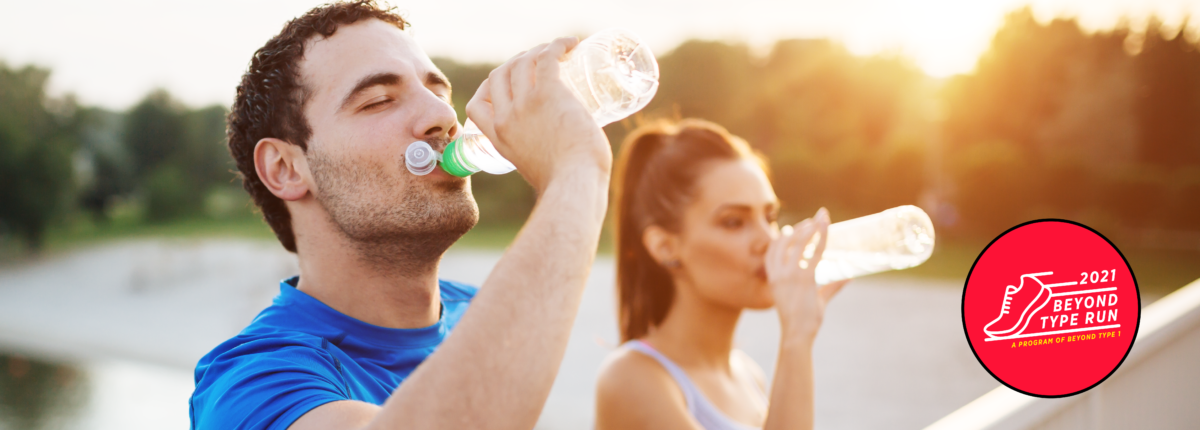How Dehydration Can Spike Your Blood Sugar
This content was created as a part of a paid partnership with Ultima Replenisher, an active partner of Beyond Type 1 at the time of publication.
Water accounts for 50 to 60 percent of your body weight—and nearly 75 percent for newborn babies! For the average adult, 100 pounds of your body weight is water.
Clearly a critical part of your body’s ability to function, staying on top of your daily hydration—especially during exercise—is an important part of diabetes management.
But nearly 75 percent of Americans are dehydrated on a regular basis.
Here, we’ll discuss dehydration and its impact on your blood sugar as a person with diabetes.
Why your body needs water
When your body’s water weight starts dropping below 50 percent for any reason, symptoms of dehydration can develop and even affect your blood sugar level.
Water helps your body function in a variety of ways, including:
- Carrying oxygen and nutrients (including glucose) throughout your bloodstream to cells
- Hormone production
- Neurotransmitter function
- Regulating your body temperature
- Keeping membranes moist
- Keeping your eyes clean and moist
- Smelling, tasting, and swallowing food
- Bowel movements
- Passing toxins and waste thru urine and sweat
- Metabolizing the food you eat for energy
- Dissolving minerals and vitamins in your food
- Producing saliva
- Lubricating your joints
- Insulating your brain, spinal cord, organs and fetus (in pregnancy)
- Protecting your joints/organs/bones thru shock absorption
Symptoms of dehydration include:
- Headache, dizziness, light-headedness
- Tiredness
- Dry mouth or dry cough
- Increased heart rate
- Low blood pressure
- Lack of appetite
- Sugar cravings
- Swelling in your feet/hands
- Muscle cramps
- Constipation
- Dark-colored urine
- And for people with diabetes: a sudden spike in blood sugar levels
How dehydration can spike your blood sugar
If you become dehydrated that means the amount of water in your bloodstream decreases which then makes the existing glucose (sugar) in your bloodstream more concentrated.
While the amount of sugar in your bloodstream hasn’t technically increased, it can result in high blood sugar levels because the ratio of sugar to water has changed.
Think of it like this: when making maple syrup, you collect sap from trees. Sap is actually 95 percent water, and only 5 percent sugar! By boiling the sap, which reduces the amount of water through evaporation, the sugar in the sap becomes more concentrated. This produces a thick, sweet syrup that tastes delicious on pancakes. Less water = more concentrated sugar.
Your bloodstream needs adequate levels of water in it to maintain that ideal ratio of water vs. glucose.
- Mild to moderate levels of dehydration—especially during hot weather, intense exercise, or illness (diarrhea or vomiting)—can easily spike your blood sugar 50 to 100 mg/dL or higher.
- Severe dehydration can be life-threatening, because of many factors including concentrated blood sugar levels and too little electrolytes, sodium and potassium.
- If you’re experiencing an illness that’s causing severe dehydration or vomiting and you’re unable to consume fluids properly, visit the Emergency Room or Urgent Care to get intravenous fluids immediately.
Simply re-hydrating via intravenous fluids or drinking water and other hydration beverages can have a big impact on bringing your blood sugar levels back down to a safe level.
Beware that hydration fluids like Gatorade and Pedialyte can contain sugar—read the nutrition labels carefully and talk to your doctor about potentially dosing insulin with the hydration beverage or choosing the “zero sugar” or “low sugar” options.
Left untreated, severe dehydration can lead to diabetic ketoacidosis and other life-threatening conditions.
How much water should you drink each day?
For most people, simply drinking water when you feel thirsty is adequate, according to recent research. (Yes, other water-based beverages count, too, but beware of high sugar quantities or consuming too much caffeine, which is a diuretic and can lead to dehydration.)
You may need more than six to eight glasses of water a day if:
- You’re taking a medication that increases your body’s urine output
- You exercise intensely, especially for those involved in endurance training
- You’re in an extremely hot weather
- You’ve recently experienced diarrhea or vomiting and need to replenish
- You’re pregnant or breastfeeding
You may need to limit your water intake if:
- You have certain health conditions, including kidney, liver or heart failure
- You’re experiencing symptoms of over-hydration
- You’re taking medications that cause water retention
- You’re taking other medications, including some antidepressants and opiates
- Your doctor has instructed you to reduce water intake for any reason
Talk to your doctor about your personal water consumption goals and concerns!





